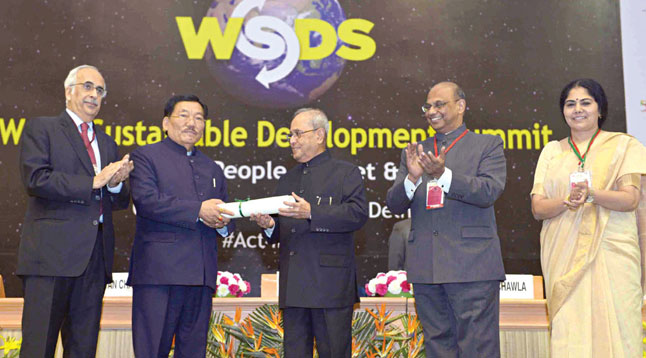
Sri Pawan Chamling, Hon’ble Chief Minister of Sikkim was conferred the prestigious 2016 ‘Sustainable Development Leadership Award’ by His Excellency (HE), Shri Pranab Mukherjee, President of India, during the World Sustainable Development Summit (WSDS) organized by The Energy and Resources Institute (TERI) at Vigyan Bhawan, New Delhi on October 06, 2016. Later in the day, Sri Chamling also delivered the special address at the plenary session of the WSDS that was held at the India Habitat Centre, New Delhi and attended by dignitaries from all across the globe.
The ‘Sustainable Development Leadership Award’ has been conferred on Sri Chamling in recognition of his vision and leadership in the sphere of environment and sustainable development, leading to establishment of Sikkim as the first and only organic state in the country, according to the citation released by TERI on this occasion. The award is conferred annually on eminent individuals engaged in encouraging global initiatives that can lead the world towards a sustainable future. Shri Chamling is the 12th recipient of the award and the previous recipients include luminaries such as Dr Manmohan Singh, the then Prime Minister of India, Mr Ban-ki-Moon, Secretary General, United Nations, HE Mr Arnold Schwarnegger, former Governor of the State of California, HE Prof Ernesto Zedillo, former President of Mexico and Director, Yale Centre for the study of globalization, USA, and Dr Shoichiro Toyoda, Honorary Chairman and member of Board of Toyota Motor Corporation, Japan.
Sikkim, under the leadership of Chief Minister, Shri Chamling has built up an impressive track record of achievements in areas of organic farming, environment conservation and sustainable development. Sikkim is the only State in India to have attained the official status of a fully organic State in January, 2016, when Prime Minister Shri Narendra Modi made the official announcement to this effect during his maiden visit to the State. The State, known as the Land of Flower, with a population of around six lakh, has now attained international acclaim and prominence for having persistently, over a period of more than a decade, pursued and successfully attained the vision of an ‘organic’ Sikkim. Around 75000 hectares of land has been converted into certified organic farms over the years, following the guidelines prescribed by National Programme for Organic Production. Sikkim contributes around 80,000 million tonnes (MT) organic production out of total 1.24 million tonnes of organic production recorded in India.
At the initiative of Shri Chamling, a historic declaration was made through a resolution in the Sikkim Legislative Assembly on February 24, 2003, for transforming Sikkim into a ‘total organic State’. Following this, the Sikkim State Organic Board was constituted on September 16, 2003, for outlining policy issues and strategic plans, as well as developing standards and regulations. The State Government stopped procuring chemical fertilizers and pesticides from 2004 onwards and also eliminated the existing subsidy to farmers for procurement of chemical pesticides. The State Government also created category wise organic farming schemes and organic action plans to set the targets of conversion of traditional to organic farming.
Besides the initiatives in organic farming, Government of Sikkim, under the leadership of the Chief Minister, has undertaken a number of other measures, with a view to promote environment conservation and sustainable development and contribute to the creation of a ‘green Sikkim’. A ban on consumption of pan masala/ gutka was enforced in the entire State in the year 1995; subsequently, in 1997, the Government passed an Act prohibiting throwing of non-degradable garbage in public drains and sewerage. This was followed up in the same year by the passage of a law prohibiting smoking in public places and in public service vehicles plying in the State.
On August 14, 1998, Sikkim became the first State in the country to impose a ban on plastics and non-degradable material. Tourists were also prohibited from carrying plastic bags and containers under the extant rules. In 2001, the State Government imposed a complete ban on collection of medicinal plants & non-timber forest produce for commercial purposes, and framed statutory rules for mandatory planting of ten saplings in lieu of one tree felled in private holdings.
In 2009, Shri Chamling started a unique programme called ‘10 Minutes to Earth’. Under this programme, on June 25 each year, the entire population of Sikkim plants a sapling each during a pre-announced 10 minute interval. In 2015, the State Government imposed a ban on use of diclofenac sodium and burning of agricultural wastes. In 2016, all the old trees in Government forests were identified as “Sikkim State Heritage Trees”. In 2016, again, the State Government re-iterated the ban on the use of Styrofoam products, including use of plastic bottled drinking water, in State Government functions and also banned burning of tyres.
The slew of initiatives taken by Government of Sikkim, under the leadership of Shri Chamling, have contributed to Sikkim being today the most environmentally conscious and progressive State of India, and today serves as an example to the entire nation.
Source: PIB